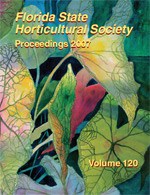Abstract
Diaprepes root weevil has become an increasingly important pest affecting Florida citrus production. No known citrus rootstock germplasm appears to be resistant to weevil larvae feeding. Our primary strategy for dealing with the Phytophthora-Diaprepes problem has been to develop complex rootstock hybrids that have the capacity to tolerate mechanical damage caused by weevil feeding and then recovery by exhibiting vigorous root growth in challenging soils inoculated with both Phytophthora nicotianae and P. palmivora. We have continued with annual crosses of superior allotetraploid somatic hybrid rootstocks, and an initial screen of resulting seed in high pH calcareous Winder soil inoculated with both Phytophthora spp. in greenhouse flats. Seed from a few open pollinations and diploid crosses were also included in the preliminary screens. Hybrids selected from the preliminary screen were propagated by rooted cuttings for use in replicated Diaprepes force-feeding assays conducted in conetainers. Hybrids selected for reduced mechanical damage were replanted in a Winder/Phytophthora mix to assess recovery potential. From 2004 to 2006, a total of seven Winder screening experiments were conducted, and several promising hybrids were identified that show excellent capacity for complete root system recovery in this greenhouse test. These are now being propagated for more extensive field evaluation, simultaneously as seed trees grow in the field. Data on seed production from the first group of hybrids screened demonstrated that some hybrids from this program are amenable to traditional seed propagation. Citrus rootstock breeding and selection at the tetraploid level maximizes genetic diversity and selection efficiency, and shows great promise for generating new rootstocks that can tolerate the Phytophthora-Diaprepes complex in clay loam soils.

